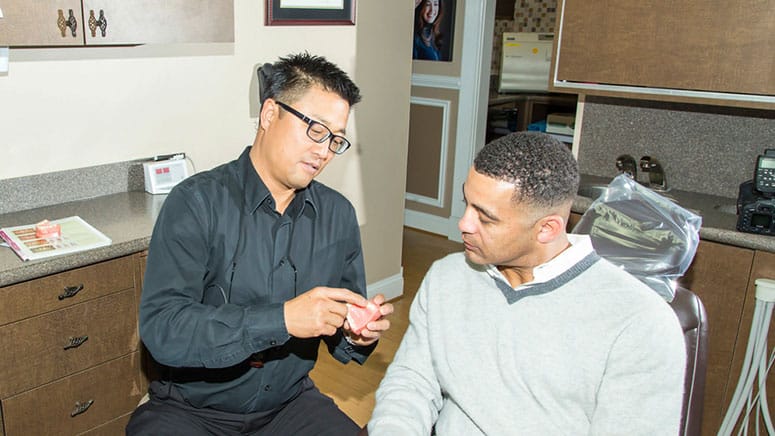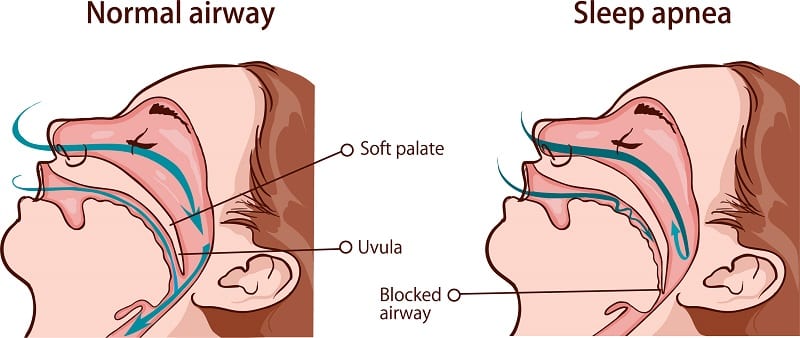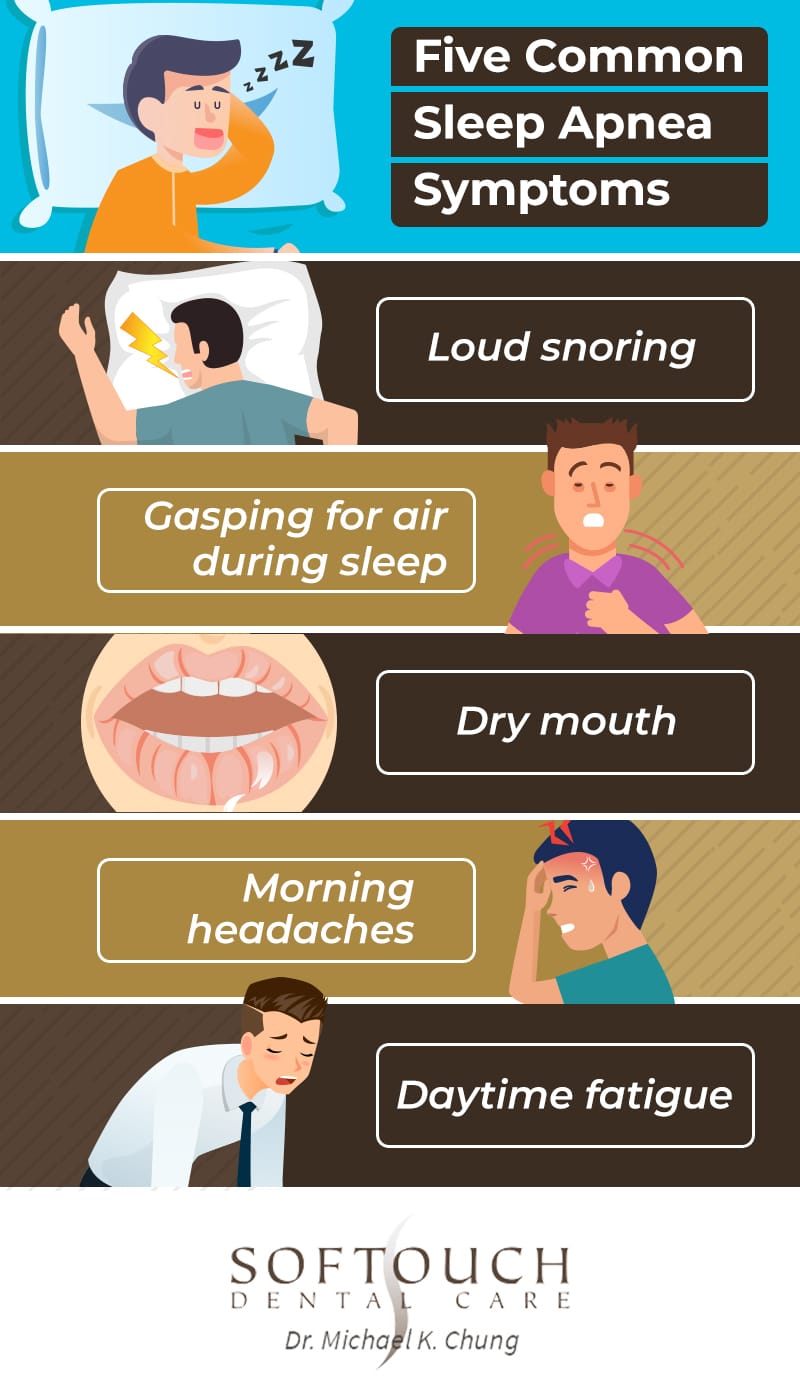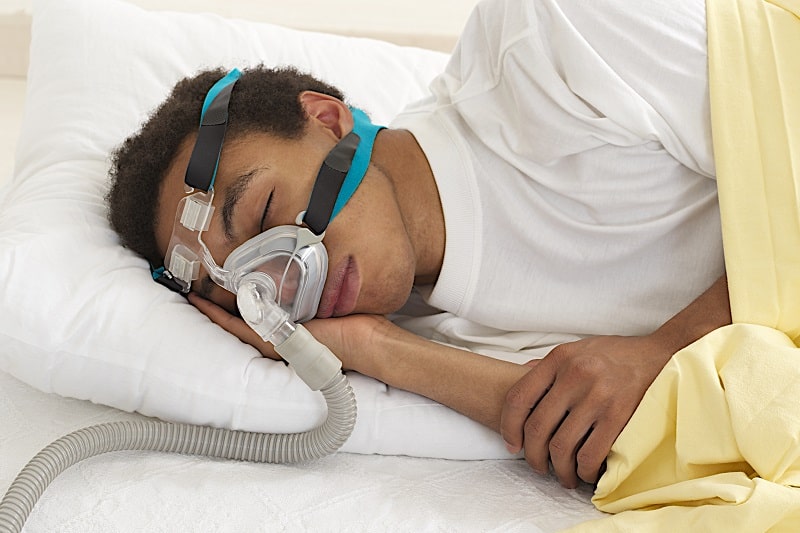
Sleep apnea is a serious condition that affects millions of Americans. It is a sleep disorder in which breathing repeatedly stops and starts throughout the night. As a result, the brain and body may be deprived of oxygen, and sleep quality is poor.
Unfortunately, sleep apnea is frequently written off as harmless snoring. Approximately 90 percent of people who suffer from this condition are never diagnosed or treated. Because there are grave health risks associated with sleep apnea, it is crucial to receive a proper evaluation from an experienced dentist.
If you suspect that you may suffer from sleep apnea, call 703-319-6990 today to arrange a consultation with Dr. Michael Chung. Softouch Dental Care serves Oakton, Vienna, McLean, and nearby areas of Northern Virginia.
- Causes of Sleep Apnea
- Obstructive Sleep Apnea Risk Factors
- Sleep Apnea Symptoms
- Health Risks Associated with Sleep Apnea
- Diagnosing Sleep Apnea
- Treating Sleep Apnea Naturally with Behavioral Therapy
- Treating Sleep Apnea with Dental Appliances
- MicrO2 Sleep and Snore Device
- Treating Sleep Apnea with Continuous Positive Airway Pressure
- Why Choose Dr. Michael Chung?
- Schedule Your Oakton Sleep Apnea Consultation
Causes of Sleep Apnea
Obstructive sleep apnea (OSA), the most common form of the condition, occurs when the airway is physically blocked or narrowed. This obstruction is usually the result of recessed jaw position, which causes the tongue to move backward and the palate in the back of the throat to close during sleep. The soft palate and uvula may also vibrate when you breathe, creating a snoring sound.
When the airway becomes completely blocked, it deprives your heart and brain of oxygen, increasing your blood pressure and heart rate. Your brain must then take you out of deep sleep to open your airway and restore proper breathing. This cycle can occur hundreds of times a night, and you may not even know it is happening.

Central sleep apnea (CSA), a much less common form of the condition, is not caused by a physical obstruction but rather a malfunction in the central nervous system that fails to relay breathing signals to the appropriate muscles. This is normally the result of health conditions such as stroke or heart disease.
Obstructive Sleep Apnea Risk Factors
Obstructive sleep apnea can affect anyone, even children. However, some people are more likely to suffer from this condition than others.
Risk factors for sleep apnea include:
- Being male
- Being over 40
- Being overweight
- Having large tonsils or a large tongue
- Having a small jawbone, a misaligned jawbone, or a shorter lower jaw than upper jaw
- Having a large neck (17 inches or more in men and 16 inches or more in women)
- Having a narrow airway
Sleep Apnea Symptoms
The most common symptom associated with sleep apnea is loud and chronic snoring. If your bed partner regularly complains about your snoring, you may want to visit our dentist for a sleep apnea evaluation. You should also look out for a noticeable choking or gasping sensation upon waking up, which signals an interruption in breathing.
Other sleep apnea symptoms are the result of poor sleep quality and include:
- Chronic fatigue and daytime drowsiness
- Dry mouth or sore throat
- Irritability or mood swings
- Poor school or job performance
- Insomnia
- Morning headaches
- Concentration problems
- Short term memory issues
- Weight gain
- Decreased sex drive

Since obstructive sleep apnea is commonly related to a structural problem within the jaw known as retrusion, patients may also experience issues with their jaw joints. These issues can manifest as TMJ or TMD, a disorder that causes facial stiffness, headaches, and other painful complaints. Dr. Chung is a physiologic/neuromuscular dentist who has extensive experience dealing with both sleep apnea and TMJ.
Health Risks Associated with Sleep Apnea
Waking frequently throughout the night is detrimental to your wellbeing, as are repeated interruptions in breathing. Sleep apnea has been linked to an increased risk of a variety of serious health issues, including:
- Heart attack
- Stroke
- Diabetes
- Depression
- High blood pressure
- Gastric reflux
- Fibromyalgia
- Cardiac arrhythmia
On top of these health concerns, sleep apnea often results in daytime drowsiness, which can be very unsafe. Drowsiness slows your reaction time and affects your concentration. Because of that, people with sleep apnea are at an increased risk of being involved in a motor vehicle accident or other dangerous situations.
Due to the threats that sleep apnea poses to your long-term health, you must seek treatment as soon as you notice symptoms.
Diagnosing Sleep Apnea
A sleep apnea diagnosis often begins with an evaluation at our Oakton practice. Before your appointment, you will need to fill out patient forms designed to help Dr. Chung understand the full scope of your situation.
Included in these forms is the Epworth Sleep Questionnaire. This self-administered survey is commonly used to asses daytime sleepiness. Daytime sleepiness is a primary sign of sleep disorders such as sleep apnea.
You may also be advised to complete a sleep apnea test called a polysomnogram. This multi-component test monitors your body while you are asleep and may be completed at a sleep disorder center or at home.
Finally, Dr. Chung will examine your mouth and jaw. Since many cases of obstructive sleep apnea are the result of suboptimal jaw position, an oral exam can help confirm the root cause of your condition.
Treating Sleep Apnea Naturally with Behavioral Therapy
If you only have a mild case of sleep apnea, you may be able to treat the condition using behavioral therapy. Dr. Chung may recommend one or more of the following minor lifestyle adjustments to help keep your airway open and eliminate interruptions in your breathing while you sleep:
- Reducing alcohol intake
- Losing weight
- Quitting smoking
- Limiting the use of sleeping pills
- Changing sleeping positions (sleeping on your side instead of your back)
- Using extra pillows to elevate your head while you sleep
- Avoiding heavy meals close to bedtime
Treating Sleep Apnea with Dental Appliances
If your sleep apnea cannot be adequately treated by making lifestyle adjustments, Dr. Chung may recommend oral appliance therapy. This treatment method uses a custom-fit device to prevent your airway from being obstructed while you sleep.
Your oral appliance mouth guard will reposition the lower jaw, tongue, or soft palate in order to keep the soft tissue in your throat from collapsing. This should reduce snoring and alleviate other harmful sleep apnea symptoms.
Dr. Chung does not believe in one size fits all oral appliances. Instead, he will create a customized device based on your dental impressions. This will improve your comfort while maximizing the effectiveness of your treatment.
MicrO2 Sleep and Snore Device
The MicrO2 Sleep and Snore Device is a type of intraoral appliance used during sleep. Made from control cured dental-grade polymethyl methacrylate (PMMA), the MicrO2 is stronger and more biocompatible than other oral appliances.
The MicrO2 is the first CAD/CAM-milled obstructive sleep apnea device. It uses upper and lower arches that can be set at different increments to move the jaw position during sleep and prevent the airway constriction caused by obstructive sleep apnea.
Unlike other oral appliances, there are no screws or elastics necessary for adjustments. A simple switch of the upper or lower arch devices is all that is needed to advance the position of the jaw.
Treating Sleep Apnea with Continuous Positive Airway Pressure (CPAP)
Continuous positive airway pressure (CPAP) uses a machine to deliver air pressure to the nasal passages through a mask. This airflow helps keep your airway open while you sleep, preventing the breathing interruptions associated with sleep apnea.
While CPAP is considered one of the most effective sleep apnea treatments when used as directed, many patients experience a low compliance rate due to the inconvenience of wearing a mask over your nose and mouth every night.

Common complains related to the use of CPAP machines include:
- Feelings of confinement
- Nasal congestion and nosebleeds
- Dry mouth
- Skin irritation
- Gas and bloating
For these reasons, Dr. Chung often recommends oral appliance therapy over CPAP.
Why choose Dr. Michael Chung?
Dr. Chung has the experience needed to accurately diagnose and treat your sleep apnea. He received his Doctorate of Dental Surgery from the College of Dental Surgery at the University of Maryland at Baltimore. He has also completed extensive post-doctoral education to better assist his patients.
As part of his continuing commitment to education, he finished the entire core curriculum at the prestigious Las Vegas Institute for Advanced Dental Studies, totaling more than fifteen years of comprehensive training.
Dr. Chung understands how frustrating sleep apnea can be. His goal is to help you find relief from interrupted sleep and its negative impact on your daily life.
Schedule Your Oakton Sleep Apnea Consultation
If you are suffering from the symptoms of sleep apnea, call Softouch Dental Care at 703-319-6990 today to schedule your initial sleep apnea evaluation. Dr. Michael Chung proudly helps patients in Oakton, McLean, Vienna, and other areas of Northern Virginia.

